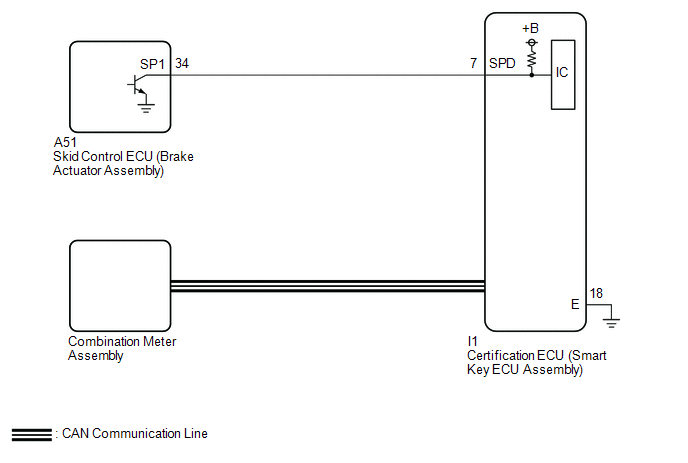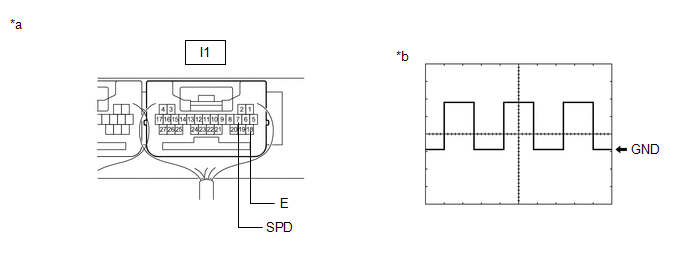- When the signal sent via either direct line or CAN communication is malfunctioning and indicates that the vehicle speed is 0 km/h (0 mph), there is no effect on vehicle behavior.
- When the signal sent via either direct line or CAN communication is malfunctioning and indicates that the vehicle is moving, the engine switch cannot be turned from on (IG) to off.
| Last Modified: 05-13-2024 | 6.11:8.1.0 | Doc ID: RM100000001CY67 |
| Model Year Start: 2019 | Model: GR Corolla | Prod Date Range: [06/2018 - 01/2019] |
| Title: THEFT DETERRENT / KEYLESS ENTRY: SMART KEY SYSTEM (for Start Function, Gasoline Model): B2282,B2283; Vehicle Speed Signal Malfunction; 2019 MY Corolla Corolla Hatchback GR Corolla [06/2018 - 01/2019] | ||
|
DTC |
B2282 |
Vehicle Speed Signal Malfunction |
|
DTC |
B2283 |
Vehicle Speed Sensor Malfunction |
DESCRIPTION
DTC B2282 is stored when the vehicle speed signal sent from the skid control ECU via direct line and sent from the combination meter assembly via CAN communication do not match.
DTC B2283 is stored when a malfunction in the vehicle speed sensor is detected.
|
DTC No. |
Detection Item |
DTC Detection Condition |
Trouble Area |
Note |
|---|---|---|---|---|
|
B2282 |
Vehicle Speed Signal Malfunction |
The vehicle speed signal sent from the skid control ECU via direct line and sent from the combination meter assembly via CAN communication do not match. (1-trip detection logic*) |
|
DTC Output Confirmation Operation:
|
|
B2283 |
Vehicle Speed Sensor Malfunction |
Either of the of the following malfunctions is detected (a vehicle speed sensor malfunction is detected) (1-trip detection logic*):
|
|
DTC Output Confirmation Operation:
|
- *: Only detected while a malfunction is present and the engine switch is on (IG).
Vehicle Condition and Fail-safe Function when Malfunction Detected
|
DTC Code |
Vehicle Condition when Malfunction Detected |
Fail-safe Function when Malfunction Detected |
|---|---|---|
|
B2282 |
|
- |
|
B2283 |
|
Steering lock motor operation is prohibited. |
Related Data List and Active Test Items
|
DTC No. |
Data List and Active Test |
|---|---|
|
B2282 B2283 |
Power Source Control
Starting Control
Combination Meter
|
WIRING DIAGRAM

CAUTION / NOTICE / HINT
NOTICE:
- When using the Techstream with the engine switch off, connect the Techstream to the DLC3 and turn a courtesy light switch on and off at intervals of 1.5 seconds or less until communication between the Techstream and the vehicle begins. Then select the vehicle type under manual mode and enter the following menus Body Electrical Smart Key. While using the Techstream, periodically turn a courtesy light switch on and off at intervals of 1.5 seconds or less to maintain communication between the Techstream and the vehicle.
- The smart key system (for Start Function) uses the LIN communication system and CAN communication system. Inspect the communication function by following How to Proceed with Troubleshooting. Troubleshoot the smart key system (for Start Function) after confirming that the communication systems are functioning properly.
- Before replacing the certification ECU (smart key ECU assembly), refer to Registration.
- After repair, confirm that no DTCs are output by performing "DTC Output Confirmation Operation".
PROCEDURE
|
1. |
READ VALUE USING TECHSTREAM (VEHICLE SPEED SIGNAL) |
(a) Enter the following menus: Body Electrical / Power Source Control / Data List.
(b) Read the Data List according to the display on the Techstream.
Body Electrical > Power Source Control > Data List
|
Tester Display |
Measurement Item |
Range |
Normal Condition |
Diagnostic Note |
|---|---|---|---|---|
|
Vehicle Speed Signal |
Vehicle being driven or stopped |
Stop or Run |
Stop: Vehicle stopped Run: Vehicle being driven at 5 km/h (3 mph) or more |
- |
Body Electrical > Power Source Control > Data List
|
Tester Display |
|---|
|
Vehicle Speed Signal |
OK:
The Techstream display changes correctly in response to the vehicle condition.
| OK |

|
GO TO METER / GAUGE SYSTEM (HOW TO PROCEED WITH TROUBLESHOOTING) |
|
|
2. |
CHECK HARNESS AND CONNECTOR (CERTIFICATION ECU (SMART KEY ECU ASSEMBLY) - SKID CONTROL ECU (BRAKE ACTUATOR ASSEMBLY)) |
(a) Disconnect the I1 certification ECU (smart key ECU assembly) connector.
(b) Disconnect the A51 skid control ECU (brake actuator assembly) connector.
(c) Measure the resistance according to the value(s) in the table below.
Standard Resistance:
|
Tester Connection |
Condition |
Specified Condition |
|---|---|---|
|
I1-7 (SPD) - A51-34 (SP1) |
Always |
Below 1 Ω |
|
I1-7 (SPD) or A51-34 (SP1) - Other terminals and body ground |
Always |
10 kΩ or higher |
| NG |

|
REPAIR OR REPLACE HARNESS OR CONNECTOR |
|
|
3. |
CHECK CERTIFICATION ECU (SMART KEY ECU ASSEMBLY) |
(a) Connect the I1 certification ECU (smart key ECU assembly) connector.
(b) Connect the A51 skid control ECU (brake actuator assembly) connector.
(c) Using an oscilloscope, check the waveform.

|
*a |
Component with harness connected (Certification ECU (Smart Key ECU Assembly)) |
*b |
Waveform |
OK:
|
Tester Connection |
Condition |
Tool Setting |
Specified Condition |
|---|---|---|---|
|
I1-7 (SPD) - I1-18 (E) |
Engine switch on (IG), vehicle being driven at approx. 5 km/h (3 mph) |
5 V/DIV., 20 ms./DIV. |
Pulse generation (See waveform) |
HINT:
The wavelength becomes shorter as the vehicle speed increases.
| OK |

|
| NG |

|
GO TO ELECTRONICALLY CONTROLLED BRAKE SYSTEM (HOW TO PROCEED WITH TROUBLESHOOTING) |
|
|
|
![2019 MY Corolla Corolla Hatchback GR Corolla [06/2018 - 01/2019]; THEFT DETERRENT / KEYLESS ENTRY: SMART KEY SYSTEM (for Start Function, Gasoline Model): HOW TO PROCEED WITH TROUBLESHOOTING](/t3Portal/stylegraphics/info.gif)
